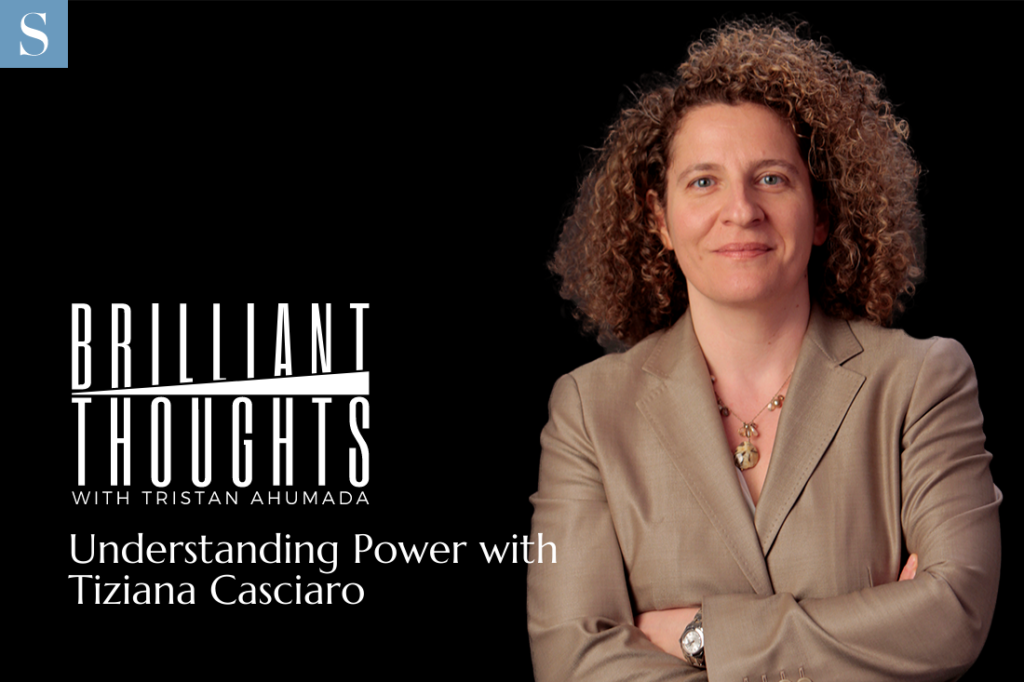Did you know that there are three misconceptions about power and the people who wield it? According to Tiziana Casciaro, professor of organizational behavior at the University of Toronto, most of us buy into those myths. We promote them every time we view power as something it’s not.
Do these statements resonate with you?
- Myth 1: “Power is the same as authority.”
- Myth 2: “Power is dirty and in the same vein as manipulation, coercion and cunning.”
- Myth 3: “Powerful people remain powerful in any scenario, across contexts.”
Casciaro’s research shows that none of these assumptions are true. Power shifts from person to person, so authority can’t be the only factor. We can’t blame bad decisions on our power, just our inability to use it correctly. And finally, your ability to stay in control depends on your relationship with others, which is always in flux.
In this episode of Brilliant Thoughts, Casciaro talks to SUCCESS People Editor Tristan Ahumada about the real meaning of power. They use Casciaro’s new book, Power For All: How It Really Works and Why It’s Everyone’s Business (co-authored with Julie Battilana), to explain confusing yet common power struggles.
If you’re an entrepreneur, you know that power is central to your success. You need it to gain influence with customers, convince people to work together and more.
But first, what is power?
Imagine you’re a recent college graduate who just got hired at a top company. In your first three months, you discover countless ways to improve the business: better project management tools, ways to streamline everyone’s workflow and straightforward meeting agendas. You share those ideas with anyone who will listen, including your boss, the most powerful person in your orbit.
But your suggestions are swept under the rug. Decision-makers are listening, but they aren’t acting on your ideas like you had hoped.
It’s a common problem for young professionals, Casciaro says. They leave college with a wealth of ideas, and they’re excited to bring them to life. But these workers keep hearing the word no. Even when their ideas are good, they run into roadblocks in the form of other people—managers, executives and other leaders. So young professionals feel like they have no power, especially when they want promotions or raises.
But power is more complex than that. It doesn’t belong to people with fancy titles or those who have more perceived authority than you. A powerful person is someone who can influence others, regardless of social standing.
“Power, ultimately, is energy,” Casciaro says. “It’s the energy you need to move the world, to advance anything. To accomplish something, you need this energy. The moment you understand it better, you’ll be able to harness it.”
How to become powerful in any situation
Casciaro says you become powerful the moment you have access to a resource other people crave. That could be knowledge, a social network, proximity to moral goodness—anything. So it’s not true that power only comes from money and status. Most people have some form of control, even if it’s not a life-changing amount.
That’s good news for entrepreneurs who want to solve problems with unique products and services. Knowingly or unknowingly, you’re asserting your power through the act of helping others.
1. Learn everything you can about human nature.
To become powerful, study the people around you. As Casciaro explains it, you need to know what excites people and makes their lives worth living. Try to uncover their wants, needs and desires so you can eventually provide one of those treasures.
“As an entrepreneur, you need, first of all, to understand human nature,” Casciaro says. “It may sound a little wishy-washy; it’s the opposite. It’s the most important tool for you to provide something people truly resonate with and that matters to them.”
Understanding human nature helps you in other areas too. You will automatically understand that sometimes you need to gain someone’s trust before letting you into their world (or their purse/wallet). That’s why companies spend decades building an identity that feels familiar to consumers.
2. Follow the power script: agitate, innovate and orchestrate.
Once you understand what power is, the next challenge is learning how to wield it. Casciaro’s game plan has three ongoing steps: agitate, innovate and orchestrate.
“You have to agitate for change, you have to innovate to provide the solution to the change and you have to orchestrate by creating a coalition of all the stakeholders,” Casciaro says.
We shouldn’t go about this process alone. Casciaro says you need a team of people to fulfill those three critical roles.
Agitators are great spokespeople. They can present a problem in a compelling way and get people interested in a solution.
Innovators are all about creativity. They take a plan one step further by identifying solutions to a problem.
Orchestrators unite a team of agitators and innovators alike, organizing their efforts into one actionable movement.
Finding where you fit in can be challenging. But sometimes, it’s as easy as knowing your strengths and being willing to use them.
“What am I good at, at this point in time? Casciaro asks. “In my evolution, in my career, in my competence, what can I deliver? Put together all these resources, and change does happen—even huge change, against all odds.”
Brilliant Thoughts with Tristan Ahumada is no longer releasing new episodes on the SUCCESS Podcast Network, but you can still listen to the full conversation below.












